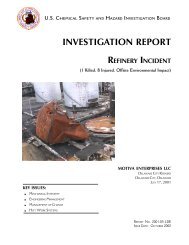Little General Store Propane Explosion - US Chemical Safety and ...
Little General Store Propane Explosion - US Chemical Safety and ...
Little General Store Propane Explosion - US Chemical Safety and ...
Create successful ePaper yourself
Turn your PDF publications into a flip-book with our unique Google optimized e-Paper software.
<strong>Little</strong> <strong>General</strong> <strong>Store</strong> September 2008<br />
Some form of state-m<strong>and</strong>ated training <strong>and</strong>/or testing requirement for propane service technicians exists in<br />
14 states, <strong>and</strong> 10 of those have specific training requirements; however, the depth of training required<br />
varies broadly. No states require emergency response training for propane service technicians.<br />
Three states require licensing for propane service technicians. States use licensing to establish <strong>and</strong><br />
enforce minimum competency st<strong>and</strong>ards for technicians; collect funds for inspection, compliance, <strong>and</strong><br />
training programs; <strong>and</strong> communicate technician qualifications to consumers. In the states that license<br />
propane service technicians, CETP is an accepted training program. Additionally, at least 10 states have<br />
licensing programs applicable to propane <strong>and</strong> natural gas appliance installers. Recurrent licensing<br />
requirements, based on state-established st<strong>and</strong>ards of training, testing, <strong>and</strong>/or experience, aim to ensure<br />
that only qualified personnel work on indoor propane <strong>and</strong> natural gas systems.<br />
West Virginia does not require propane service technicians to be trained, certified, or licensed. Appendix<br />
D contains a table of the state requirements. 39<br />
5.3.1.2 NFPA 58 Training Recommendations<br />
NFPA 58 recommends training for propane industry employees who perform activities within its scope,<br />
which includes those who transport <strong>and</strong> transfer LP gas. The st<strong>and</strong>ard states that these employees “shall<br />
be trained in proper h<strong>and</strong>ling procedures. Refresher training must occur at least every 3 years. The<br />
training shall be documented.” 40 An appendix note states that refresher training may be less intensive<br />
than original training. However, NFPA 58 does not elaborate on what constitutes initial training. It<br />
includes no guidance suggesting a scope, timeframe, or testing component for facilitating an enforceable<br />
training st<strong>and</strong>ard for states that have adopted NFPA 58, including West Virginia.<br />
39<br />
Information on state training requirements was provided to the CSB by PERC.<br />
40<br />
NFPA 58 – 2008 Section 4.4 “Qualifications of Personnel.”<br />
37









